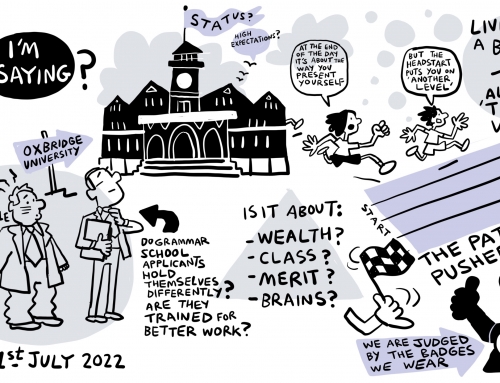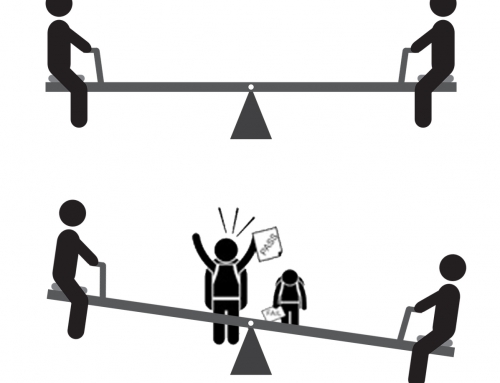Do politicians ever do anything they think is unpopular? It feels as if ‘doing the right thing’ isn’t enough reason to act, the public need to shout and demand action and only then will politicians fix anything. Academic selection is an obvious example of a policy that’s stuck because ‘the right thing’ doesn’t have enough public shouting to inspire action. There’s an absolute mountain of evidence that it’s a terrible system, but no political party has the will to change this.
People think selective education is popular, but it’s not as simple as that. Grammar schools are quite popular among the wealthy, middle class parents, who believe they’ll win the places. The losers of the selective system are not shouting at all, but that’s entirely a side effect of the system. Who wants to shout about a child being judged inferior and not ‘smart’? Who wants to shout about messed up schools when your child has to make the best of them? It’s perfectly natural to hate the system of rotten judgements, stressful tests, and expensive tutors. It’s also natural to not want to criticise a grammar school system used by friends and relatives, and that you’d wanted to use yourself. It gets complicated to shout when a quarter of your community benefit from something. It’s hard to say you want the winners to give something up, when the losers are mostly quiet and uncomplaining.
So what could a smart politician do to break this cycle of silence from the losers, and complacency from the winners?
They could consider a gradual plan with a few stages that nudged the public to demand action.
Stage 1: Public awareness – we need people to understand the problems
Politicians should ensure people understand the problems of selection, particularly parents and pupils who use grammar schools. People are not regularly confronted with the idea that these schools are antisocial things. The selective system is dividing communities for no good reason and it’s rare for anyone to question it. There’s a lazy assumption that the test ‘works’, that the ‘right’ children are selected, that grammar school children ‘need’ different schools. None of these things are true.
So, if I were a politician I would put a spotlight on the truth. I would force every grammar school to publish stats on their website and tell parents key points explaining the differences of the selective system.
I would make it compulsory for 11-plus test companies to explain the accuracy of their tests in simple terms, so parents understand that either a pass or fail is liable to be wrong, particularly for the children at the borderline point.
I would ensure that every time a grammar school publishes results there has to be a disclaimer stating that selecting high attaining children means better results are due to this, and results are not comparable with inclusive schools.
I would ask councils to publish reports based on surveys, to show how much tuition costs local parents each year.
I would ask grammar schools to publish statistics for their intake of SEN pupils, disadvantaged pupils, privately educated and out of county pupils.
I would ensure grammar schools were open about their attainment profile. So parents might know that one Kent grammar school selects pupil in the top 20% for attainment, while another has a lower bar and admits pupils in the top 40%.
Councils in fully selective areas should also be asked to produce an annual report detailing problems and plans for selective education. Low numbers of disadvantaged pupils, why is this, can anything be done? An inaccurate test, what will you do about that? The area’s results should be scrutinised, and adjusted for pupil backgrounds. What about the impact on pupil wellbeing, perhaps a survey of primary teachers could review this? If an area wants to offer selective education it should justify that. All this should be a nudge towards going comprehensive, a reminder that the problems of selective education can not be ignored. Authorities with scattered grammar schools could produce a slimmed-down version of this report.
This openness would dispel myths about grammar schools, and about the type of children who attend them. Selective schools would be more accountable to their communities, and their communities would better understand the problems.
Stage 2: Reward the activity you want to encourage – we need parents to send high attaining pupils to inclusive schools, not grammar schools.
Too often comprehensive education campaigners concentrate on the problems facing low and medium attainers, without seeming to realise that grammar schools meet a perceived need. Whether or not high attainers really do need dedicated education, in selective areas it’s a belief entrenched for decades, and never questioned. No wonder grammar school supporters don’t engage with us, we’re taking a benefit away from them and offering nothing in return.
If I were a politician I’d offer a High Attainers Premium to inclusive schools in selective areas. This could be used to ensure secondary modern schools offered things like mentoring or tuition, help with personal statements, and other dedicated support for children aiming for higher education. This kind of scheme would ensure inclusive schools would be on a level playing field with grammar schools for benefits for these children. There’s no reason to think non-selective schools couldn’t become better than grammar schools for high attaining pupils. Parents would start to have confidence in a comprehensive school system.
Stage 3: Sanctions for problem schools – grammar schools need to change
If we’ve created a situation where parents understand grammar schools are not ‘good neighbour’ schools, and know that high attainer’s needs can be met in inclusive schools, it makes the next step a lot easier.
We could use the numbers published by grammar schools and ask to see improvement. If everyone knows a grammar school admits 15% of pupils who were previously educated at prep schools, and just 3% disadvantaged pupils, it is hard to argue that this school is serving its community properly. A school like this could be given a target to meet. Admit 15% disadvantaged pupils or lose some of your selectivity. A school that couldn’t meet a target might be asked to become only partially selective, and encouraged to make a plan to turn to turn fully comprehensive. If it turned comprehensive it could take advantage of the high attainers premium – a policy lever to persuade it to drop the test altogether.
Perhaps the unique circumstances of this issue means the public will never shout? If that’s the case we shouldn’t just let selective education go unchallenged. An 11-plus school system is both wrong and unnecessary. Just 5% of secondary schools are selective, but for every grammar school there are 3 secondary moderns so the impact of selection is felt by a great many children.
Politicians should not look away from this problem but should look creatively to find a solution. Maybe we need to take a longer-term approach to change, or look for a solution that could win cross-party support? The plan detailed here is far from perfect, and it’s just one idea. There are a great many policy ideas that could be devised to offer careful, unthreatening routes to comprehensive education in selective areas. We need ideas because politicians have shown no willingness to act independently, and academic selection is a clear injustice that needs attention.
Our Future Thoughts series of articles are opinion pieces designed to provoke debate, they represent the views of the author and not Comprehensive Future policy.
Jo Bartley is a parent in Kent and Campaign Support Officer for Comprehensive Future. She is writing this in her personal capacity.




